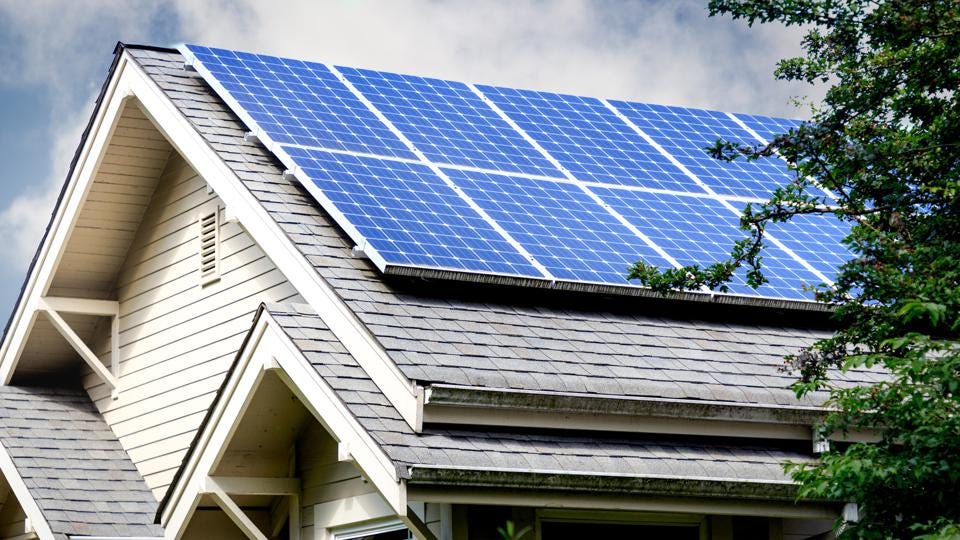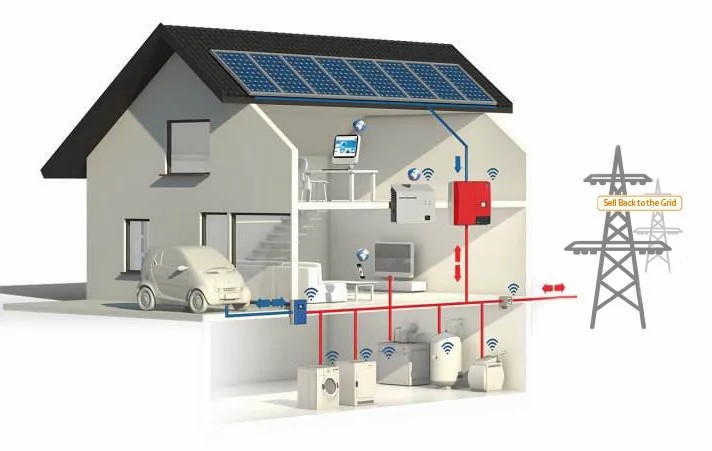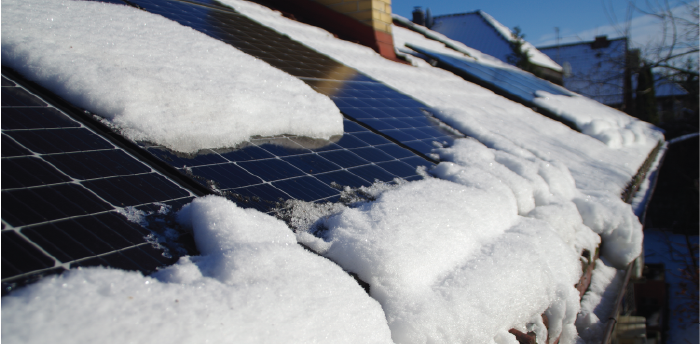Geçmişten bugüne yaşam maliyetlerini dikkatlice kaydeder ve karşılaştırırsak,'İnkar edilemez bir gerçekle karşılaşacağız: Yaşam maliyetimiz sürekli artıyor ve harcamalar neredeyse her açıdan artıyor. Gıdadan barınmaya, eğitimden sağlık hizmetlerine kadar neredeyse her günlük harcama artıyor. Özellikle dikkat çeken, hayatımızın hemen her köşesini etkileyen enerji maliyetidir.
Küresel enerji talebindeki sürekli artış ve geleneksel enerji kaynaklarının kademeli olarak tükenmesiyle birlikte, elektrik maliyeti, özellikle de hane halkı elektrik faturaları, giderek daha pahalı hale geliyor. Bu sadece artan hammadde maliyetlerinden kaynaklanmıyor, aynı zamanda enerji altyapısının bakım ve yükseltme masraflarını da içeriyor. Birçok aile için elektrik faturaları önemli bir mali yük haline geldi, hane bütçesinin önemli bir bölümünü tüketiyor ve eğitim, sağlık hizmeti veya tasarruf gibi diğer önemli ihtiyaçlar için yeterli fon ayırmayı daha da zorlaştırıyor.
Üstelik, artan elektrik maliyetlerinin aksine, birçok insan'maaş artışı, yaşam giderlerindeki artışla aynı hızda ilerlemedi. Kazançlar ve harcamalar arasındaki bu dengesizlik, aileler üzerindeki mali zorlanmayı daha da kötüleştiriyor ve bütçeleri ve tasarrufları makul bir şekilde planlamayı zorlaştırıyor.
Belki sen'Sosyal medya aracılığıyla her zaman daha fazla insanın kendi ev güneş enerjisi sistemlerini kurduğunun farkındaydık. Şunu merak ediyor olabilirsiniz: Bu sistemler gerçekten enerji harcamalarımızdan tasarruf etmemize yardımcı olabilir mi? Bu soruyu ele almak için, bu sistemlerin nasıl kurulduğunu ve daha verimli bir şekilde çalışmamıza nasıl yardımcı olabileceğini anlamamız gerekir.
Güneş Enerjisi Depolama Sisteminin Prensibi ve Bileşenleri
Güneş ışığı bu güneş hücrelerine çarptığında, fotonlar silikon malzemedeki elektronlarla etkileşime girerek bir elektrik akımı üretir. Bu olguya fotovoltaik etki denir. Güneş panelleri tarafından yakalanan enerji doğru akım (DC) elektriği biçimindedir. Bu DC gücü genellikle bir şarj kontrol cihazı aracılığıyla bir pil depolama sistemine iletilir. Doğru akım daha sonra bir invertör tarafından alternatif akıma (AC) dönüştürülür ve son olarak ev aletlerine enerji sağlanır.
Güneş enerjisi sistemlerinin prensibini anlamak, ev kullanımı için güneşten enerji elde etme süreçlerini anlamamıza yardımcı olur. Bir ev güneş enerjisi sistemi kurmak için, aşağıdaki gibi belirli temel bileşenler gereklidir:
- Güneş Panelleri: Bunlar sistemin kalbidir ve güneş enerjisini yakalamaktan ve onu elektrik enerjisine dönüştürmekten sorumludur. Paneller genellikle güneş ışığını doğru akım elektriğine dönüştüren birden fazla güneş hücresinden oluşur.
- İnverter: İnverter, güneş panelleri tarafından üretilen doğru akımı (DC) ev kullanımı için alternatif akıma (AC) dönüştürür. Alternatif akım, çoğu ev aletinin kullandığı elektrik türüdür. İnverter, sisteminize bağlı olarak şebekeden bağımsız veya şebekeye bağlı olabilir.
- Pil Depolama Sistemi: Piller, fazla güneş enerjisini depolayarak güneşin olmadığı zamanlarda veya elektrik talebinin en yüksek olduğu zamanlarda kullanılmasını sağlar. Aslında, Pknergy, piller ve invertörler (isteğe bağlı şebeke dışı/şebekeye bağlı tip) içeren, kurulumu daha kolay ve %50 daha az yer kaplayan bazı hepsi bir arada üniteler satmaktadır.
Faydaları tartışırken, söz konusu maliyetlerin farkında olmak önemlidir. Gerekli maliyetler, tüm temel malzemeleri (bazı kablolar ve montaj sistemleri için maliyetler belirtilmemiş olsa da, bunlar genellikle bir güneş enerjisi sisteminin toplam maliyetinin küçük bir kısmını temsil eder) ve işçilik maliyetlerini içerir. Bir güneş enerjisi sisteminin faydaları nelerdir ve sistemin kullanımını nasıl en üst düzeye çıkarabiliriz?
Güneş Enerjisi Depolama Sistemlerinin Faydaları:
Ev tipi güneş enerjisi sisteminin en doğrudan faydası elektrik faturalarında potansiyel tasarruftur. Örneğin, ortalama 5 kW'lık bir konut güneş sistemi elektrik maliyetlerinde ayda 100 ila 150 dolar arasında tasarruf sağlayabilir. Gerçek tasarruflar, güneş paneli dizisinin boyutu, enerji kullanım kalıpları ve bölgenizdeki elektrik maliyeti gibi çeşitli faktörlere bağlıdır.
Doğrudan tasarrufların yanı sıra, birkaç gizli fayda da var:
Elektrik Kesintisi Kayıplarının Azaltılması:
Ev güneş enerjisi sistemleri, özellikle depolama cihazlarıyla donatılmış olanlar, şebeke kesintileri sırasında yedek güç sağlayabilir, rahatsızlığı ve olası kayıpları azaltabilir. Örneğin, buzdolaplarını ve diğer temel cihazları çalışır durumda tutmak, yiyeceklerin bozulmasını veya diğer acil durumları önler.
Net Ölçüm ve Elektrik Satışı:
Net ölçüm, ev güneş enerjisi sistemlerinin sahiplerinin kullanılmayan güneş elektriğini şebekeye geri satmalarına, elektrik faturalarında kredi veya ek gelir elde etmelerine olanak tanır. Bu mekanizma, güneş sistemlerinin yalnızca kendi elektrik ihtiyaçlarını karşılamasını değil, aynı zamanda bir gelir kaynağı olmasını da sağlar.
Devlet Teşvikleri:
Birçok ülke ve bölge, güneş enerjisi sistemleri için finansal destekler, vergi teşvikleri veya diğer teşvikler sunarak, ilk yatırım maliyetini düşürüyor ve yatırım getirisini hızlandırıyor.
Yükselen Elektrik Fiyatlarına Karşı Koruma:
Güneş enerjisi sistemleri nispeten istikrarlı ve öngörülebilir bir enerji maliyeti sağlayarak kullanıcıların elektrik fiyatlarındaki olası gelecekteki artışlardan kaçınmasına yardımcı olur. Kurulduktan sonra güneş elektriğinin marjinal maliyeti neredeyse sıfırdır ve uzun vadeli ekonomik güvenlik sunar.
Dairesel Temiz Enerji:
Güneş enerjisini bir güç kaynağı olarak kullanmak, fosil yakıtlara olan bağımlılığı azaltmaya, sera gazı emisyonlarını ve hava kirliliğini azaltmaya yardımcı olur ve çevre koruma açısından faydalıdır. Miktarını belirlemek zor olsa da, bu uzun vadeli çevresel faydalar yaşam kalitesini iyileştirmek ve doğal kaynakları korumak için çok önemlidir.
Genel olarak, ev güneş enerjisi sistemlerinin gizli faydaları doğrudan ekonomik kazanımların ötesine geçerek gelişmiş enerji güvenliği, azaltılmış çevresel etki ve toplumsal katkıları içerir. Bu faydaların ne ölçüde gerçekleştirileceği coğrafi konum, politika ortamı ve şebeke koşulları gibi çeşitli faktörlere bağlıdır.
Ev tipi güneş enerjisi sistemlerinin nihayetinde elektrik ürettiği göz önüne alındığında, güneş enerjisi depolama sistemlerinin verimliliğinin nasıl artırılacağı konusunun tartışılması, elektrik maliyetlerinin nasıl azaltılabileceği düşünüldüğünde hayati önem taşımaktadır.
Mükemmel Bir Ev Enerji Depolama Bataryası Nasıl Seçilir
Doğru ev güneş enerjisi depolama pilini seçmek, seçtiğiniz pilin enerji ihtiyaçlarınızı karşılamasını ve optimum performans sunmasını sağlamak için birkaç önemli faktörü göz önünde bulundurmayı gerektirir. İşte güneş enerjisi depolama pili seçmek için bazı önemli yönergeler:
- Kapasite ve Güç:Kilowatt-saat (kWh) olarak ölçülen pilin kapasitesi, ne kadar enerji depolayabileceğini belirlerken, kilowatt (kW) olarak ölçülen güç, ne kadar enerji üretebileceğini belirler. Seçilen pilin kapasitesinin ve gücünün evinizin enerji ihtiyaçlarına uyduğundan emin olun. Pknergy'Yığınlanabilir piller, ihtiyaç duyduğunuz kapasiteyi karşılayacak şekilde esnek bir şekilde yapılandırılabilir.
- Döngü Ömrü ve Garanti:Bir pilin çevrim ömrü, belirli bir performans seviyesini korurken geçirebileceği şarj ve deşarj çevrimlerinin sayısını ifade eder. Uzun garantili ve yüksek çevrim ömrüne sahip pilleri seçin, bu da uzun bir süre boyunca güvenilir hizmet sağlayacakları anlamına gelir. Örneğin, Pknergy'Uzun ömürlü duvar tipi akülerimiz 7000'den fazla çevrim sunarak sisteminizin uzun süre yüksek seviyede çalışmasını sağlar.
- Deşarj Derinliği (DoD):Deşarj derinliği, pilin toplam kapasitesinin ne kadarının kullanılabileceğini ifade eder. Yüksek DoD'ye sahip piller, yeniden şarj etmeniz gerekmeden önce daha fazla depolanmış enerji kullanmanıza olanak tanır.
- Yeterlik:Bir pilin verimliliği, elektrik enerjisini depolama ve serbest bırakma performansına atıfta bulunur. Yüksek verimli piller, şarj ve deşarj süreçleri sırasında daha az enerji kaybına sahiptir.
- Kimyasal Bileşimi:Piyasadaki yaygın güneş enerjisi depolama pilleri türleri arasında kurşun-asit ve LiFePO4 piller bulunur. Burada, güvenlikleri ve dayanıklılıkları nedeniyle LiFePO4 pilleri öneriyorum.Lityum demir fosfat pillerin kurşun-asit pillere kıyasla ev enerjisi depolama pilleri olarak neden daha uygun olduğunu anlayın.
- Maliyet ve Bütçe:Satın alma, kurulum ve uzun vadeli bakım masrafları dahil olmak üzere akünün toplam maliyetini göz önünde bulundurun. İlk yatırım daha yüksek olsa da, uzun vadeli faydalar ve performans birincil hususlar olmalıdır.
- Kurulum ve Bakım Gereksinimleri:Akü sisteminin kurulum gereksinimlerini ve uzun vadeli bakımının kolaylığını ve maliyetini göz önünde bulundurun.
- Emniyet:Farklı pil tipleri güvenlik açısından farklılık gösterebilir. Seçilen pil tipinin özellikle aşırı ısınma ve aşırı şarj konusunda iyi bir güvenlik kaydına sahip olduğundan emin olun.Akü güvenliği açısından BMS sisteminin önemini anlayın.
- Marka ve Üretici İtibarı:Kaliteli ve güvenilir müşteri hizmeti almak için bilinen ve itibarlı bir markayı tercih edin.
Pknergy, dünya çapında çeşitli bölgelere ve ülkelere profesyonel pil özelleştirme hizmetleri sunan pil üretiminde 20 yılı aşkın deneyime sahiptir. Günümüzde Pknergy, raf tipi ve duvara monte piller dahil olmak üzere güneş enerjisi depolama alanında birçok önde gelen ev enerji depolama pili de üretmektedir. Profesyonel bir satış ekibimiz ve kapsamlı satış sonrası desteğimiz bulunmaktadır. Hikayesi hakkında daha fazla bilgi edininÇin enerji depolama pili üreticisiEnerji.
Çözüm
Güneş enerjisi sistemleri gerçekten de elektrik maliyetlerinden tasarruf sağlayabilir. Güneş sisteminin faydaları anında olmasa da, tasarruflar zamanla giderek daha önemli hale gelir. Bir güneş sistemi kurmak, giderek pahalılaşan bir elektrik şebekesine olan bağımlılığınızı azaltmak anlamına gelir. Küresel enerji fiyatları dalgalandıkça, şebekeye güvenen tüketiciler artan elektrik maliyetleriyle karşı karşıya kalabilir. Güneş enerjisi sistemleri, size daha fazla ekonomik bağımsızlık kazandıran istikrarlı ve öngörülebilir bir alternatif enerji kaynağı sunar.
Güneş enerjisi sistemlerini kullanmak, enerji tedarikiyle ilişkili belirsizlik ve risklerden kaçınmanıza da yardımcı olur. Enerji krizleri, şebeke arızaları veya doğal kaynak kıtlıkları karşısında, güneş enerjisi sistemleri istikrarlı ve güvenilir bir alternatif enerji kaynağı sağlar. Bu yetenekler şüphesiz doğrudan ekonomik kazanımların ötesinde sayısız fayda sunar.
Ev güneş enerjisi sistemleriyle ilgileniyorsanız lütfen Pknergy ile iletişime geçin. En yüksek kaliteyi sunuyoruzev güneş enerjisi depolama çözümleri, toptan ve özelleştirme hizmetleri dahil! Bugün bizimle güneş pili pazarınızı keşfetmeye başlayın!
Yayınlanma zamanı: 17-Kas-2023



